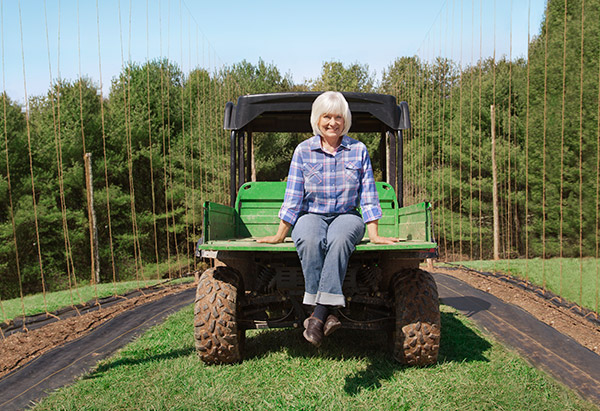How to Grow Money on Trees (Well, Technically, Vines...)
Quick to sprout and demanding to harvest, hops give beer its zing. And—as Rita Pelczar and her husband discovered when they bought a North Carolina farm—everyone wants them.

Photo: Jessica Antola
In 2007, over pizza and pints of porter at a local brewing company in Asheville, North Carolina, Rita Pelczar's 21-year-old son, Jack, had an idea: "Mom, why don't you grow hops?" he said. Rita, a former horticulture professor, had decamped from Maryland to a 30-acre farm in the mountains with her husband, John, who was retiring (Rita would still work part-time as an editor). There they hoped to get into agriculture and "grow something interesting."
Rita knew very little about hops—the female cones of a climbing vine that give beer its flavor and bitterness—but had heard that Asheville was home to a thriving microbrewery industry, part of a nationwide explosion of "craft" beers. In her youth she'd drunk mass-produced National Bohemian, so she was intrigued to learn that "beer is the new wine," as she explains.
A little research revealed that hops farming had not kept pace with the demand. And that crop failure in Europe and a warehouse fire in the Pacific Northwest had helped drive the price from several dollars up to $30 per pound. Rita and John suspected that if they built it—a hops farm—some of the area's many microbrewers would come.
The couple started small, planting four each of five hops varieties to determine which would thrive in their mountainous environment. Two of the strains flourished, and soon the couple had one full acre in production; they built 12-foot-tall and, later, 20-foot-tall wooden trellises that support the lines the vines climb, and occasionally enlisted their three grown kids to shovel manure. Now they harvest the cones themselves multiple times a year, often using a ladder on the back of a utility vehicle—and while the process is labor-intensive, they turned a profit in 2012. "We've cracked the code," says Rita proudly. They've also become members of a vibrant and growing community of local beer enthusiasts.
Meanwhile they've had no trouble finding buyers for their "wet" hops, which, used within 48 hours of harvest, produce a more lively taste than the dry variety that is easily shipped by farmers across the country. They've even started dabbling in home brewing. "The kids shamed us into it," admits Rita. "They couldn't believe we weren't making our own beer." In fact, she says, "we've got an amber ale fermenting in the closet right now."
More on Growing Anything
Rita knew very little about hops—the female cones of a climbing vine that give beer its flavor and bitterness—but had heard that Asheville was home to a thriving microbrewery industry, part of a nationwide explosion of "craft" beers. In her youth she'd drunk mass-produced National Bohemian, so she was intrigued to learn that "beer is the new wine," as she explains.
A little research revealed that hops farming had not kept pace with the demand. And that crop failure in Europe and a warehouse fire in the Pacific Northwest had helped drive the price from several dollars up to $30 per pound. Rita and John suspected that if they built it—a hops farm—some of the area's many microbrewers would come.
The couple started small, planting four each of five hops varieties to determine which would thrive in their mountainous environment. Two of the strains flourished, and soon the couple had one full acre in production; they built 12-foot-tall and, later, 20-foot-tall wooden trellises that support the lines the vines climb, and occasionally enlisted their three grown kids to shovel manure. Now they harvest the cones themselves multiple times a year, often using a ladder on the back of a utility vehicle—and while the process is labor-intensive, they turned a profit in 2012. "We've cracked the code," says Rita proudly. They've also become members of a vibrant and growing community of local beer enthusiasts.
Meanwhile they've had no trouble finding buyers for their "wet" hops, which, used within 48 hours of harvest, produce a more lively taste than the dry variety that is easily shipped by farmers across the country. They've even started dabbling in home brewing. "The kids shamed us into it," admits Rita. "They couldn't believe we weren't making our own beer." In fact, she says, "we've got an amber ale fermenting in the closet right now."
More on Growing Anything



